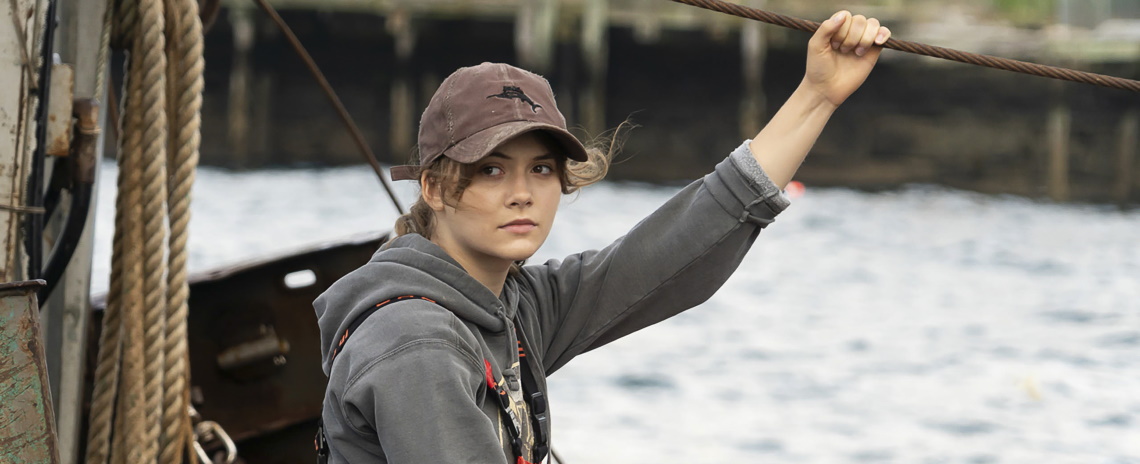Film is music, and not just in the sense of seeing Gene Kelly splashing in some puddles or Singin’ in the Rain. The medium is a rhythmically constructed set of moving images (now with sound!), like instruments realizing notes from sheet music. Lucino Visconti conducts full-bodied chamber music. Claire Denis does avant-garde jazz. Quentin Tarantino leads a classic-rock cover band (the best of its kind, in all due respect). From piano players live-scoring early silents to Oneohtrix Point Never’s pulsating electronica for the Safdie brothers, music itself is integral to the cinematic experience – so much so its absence can even be as deafening as a cymbal crash.
No wonder filmmakers so often choose subjects attuned to musical frequencies. Even in a time of sparse offerings, there have still been plenty of music-minded features released. Ma Rainey’s Black Bottom, The Prom, Tina, Annette, The Sparks Brothers, Sisters with Transistors, Summer of Soul, In the Heights, Sound of Metal, Stardust, Bill & Ted Face the Music, and the derided Sia-directed surprise Golden Globe nominee that thinks it's OK to just call itself Music are just a few offerings from the past 12 months. Even within the past couple of weeks, one can just pick their platform of choice and wind up with new music movies. The Aretha Franklin biopic Respect is now on the big screen; Sundance darling CODA is streaming on AppleTV+; and scrappy U.K. indie Beats is newly out on home video in a beautiful Blu-ray edition. Timing isn’t the only factor harmoniously linking these three. They may be merely middling to modest in overall quality, but they also uniquely feature not just the what and who behind the music, but the why and how driving the beats of their subjects’ hearts.
Over its 2.5 hour runtime, Liesl Tommy’s Respect mostly adheres to rote rise-and-fall-and-rise-again musical-drama conventions. However, the Aretha Franklin biopic excels when depicting the work of a recording and stage act. Fictionalizing the artistic process has never been easy on film, especially when it comes to the act of crafting familiar tunes. Scenes of pop stars and company around the piano are typically corny softballs to audience members who are likely already in their theater seats because they know the subject. There are few exceptions. Love & Mercy has some: Brian Wilson (Paul Dano) manically building a funhouse recording studio of live animals, a fire truck, and a full orchestra for the Beach Boys’ Pet Sounds, made credible by verisimilitude, performance, and detailed production choices. Half of Bill Pohlad’s bifurcated feature is driven by the agony and ecstasy of creating a fulsome realization of abstract ideas in one’s head.
More formulaic narratives make up the bulk of this micro-genre, and they often contain risible compressed liner notes typically themetized to neatly fit their trajectories. Queen needs a new sound? 2018’s deplorable Bohemian Rhapsody has each band member quickly layering each of their instruments on top of the next to appear as if the band delivered a fully formed recording of “We Will Rock You” within mere seconds. At least Tommy’s tony yet gorgeously mounted Oscar-bait isn't reductive about the process and even manages to justify narrativization of its chosen tracks. Fueled by a restless night and a few too many cocktails, Franklin (Jennifer Hudson, who’s better singing and playing than not, but still eons beyond her Oscar win for one number in 2006’s Dreamgirls) stumbles her way into reconfiguring Otis Redding’s titular song as an anthemic totem of rock music. “Respect” has been running on a loop in Aretha’s head, acting as a negotiation scenario with her abusive husband, Ted (an against-type Marlon Wayans). All she’s asking for is a little respect when she comes home, to put it mildly. Re, as she’s referred to by her two sisters (Hailey Kilgore and Brenda Nicole Moorer), gathers around the piano with them, playfully riffing, finding a cohesive groove, and making adjustments where necessary. They even put an authorial stamp on it: The first syllable of the song’s title and subject is coincidentally also her nickname, and a repetitive refrain of it becomes the counter-melody.
Eventually, Franklin’s swaggering act of gender-flipped sublimation overcomes Redding’s own recording in the popular consciousness and becomes a signpost of a burgeoning feminist movement. To a lesser degree than in Tina, Daniel Lindsay and T. J. Martin’s excellent Tina Turner doc from this year, Respect finds the schism in the musician’s popular output. Aretha is the performance of a mythic symbol of independence by Re, who’s stuck on the hamster wheel that is the cycle of abusive codependency. Separating the art from the artist isn’t always about making a decision to sieve personal behavior away from an understanding of an artist’s output; it’s also negotiating in the opposite direction to ask, “Does the output also represent the person?”
That separation can be hard for fans. Annie Clark of St. Vincent, an indie act whose rising popularity seems to have become the very subject of her recent work, found herself in a PR dust-up when she requested journalist Emma Madden not publish an interview they had recently done in promotion of the St. Vincent album Daddy’s Home. Within it, Clark got cagey with the journalist for getting a little too personal about the album’s supposed biographical origins – stories about Clark’s father’s white-collar crimes the artist had already talked about in early interviews about her new work. The songs seem autobiographical on their surface, but Clark begged the question why she can’t be a storyteller of characters that, although born from her, aren’t necessarily depictions of her. Her argument is against pat interpretation (without directly nodding to Susan Sontag). People contain multitudes, and any worthy work from them should be evaluated and appreciated accordingly and amorphously.
CODA, in more indirect ways, is also preoccupied with this idea. Rubi Rossi (Emilia Jones) is a high-school senior, and a particularly musically gifted one. While she’s working on the family fishing boat, she belts into the open air. Meanwhile, her deaf brother (Daniel Durant) and father (Troy Kotsur) continue pulling in and sorting fish together to make a measly few hundred bucks for the day. The two men appreciate music in their own way – her father blasts rap in his pickup because he likes the vibrations – but they don’t know the extent of her talent. That doesn’t mean they’re not close. In fact, the trio and the family matriarch (Marlee Matlin) are so tight there’s nary a subject they won’t broach – from sex to drugs to everything in between and beyond.

The Rossi family has been through it, and the actors lend this saccharine-sweet crowd-pleaser a lived-in quality when the script occasionally fails them. In 17 years, is that really the first time Rubi’s gotten that fart joke from her father? One part To Sir with Love, other watered-down parts from American indies, director Sian Heder’s unprecedented Sundance Film Festival acquisition – $20 million from Apple for its streaming service – credibly sits at the intersection of socioeconomic, familial, and ability issues while also whiffing of engineered earnestness. This is especially true once Rubi is finally convinced to join her high school’s choir, headed by the flamboyantly blunt Bernardo Villalobos (Eugenio Derbez). He’s the hip, stern yet supportive teacher out of movie textbooks who nurtures Rubi’s talents all the way up to her eventual vocal audition for Berkeley College.
However, she is still necessary support for her family, which is in a dire financial situation, and has a budding romance with her duet partner (Ferdia Walsh-Peelo) and an ache to perform. The tension between these discrete lives is neatly encapsulated by her song of choice for her moment of truth in front of her dream school’s faculty. Rubi didn’t write Joni Mitchell’s early classic “Both Sides, Now,” but she understands its tale of internal tides turning. Similar to Redding’s “Respect,” the Mitchell track took on its own life through interpretation. Folk singer/songwriter Judy Collins hit the charts with her version of it, turning the Mitchell original into a modern folk standard that, for some, represented the sour transition from the 1960s into the 1970s. Neither CODA nor Rubi seem interested in that context. Instead, it’s a reach toward understanding and a therapeutic expression of the myriad anxieties and discoveries the young woman carries. However, like Franklin, Turner, Clark, and nearly any artist, her drive to create and the results from it are multifaceted. They can’t be pinned down to an easy biographical read.
In legal terms, most artists have full control of how their work is consumed, but how the public decides to interpret it is completely out of their hands. There’s an unholy trilogy of nasty, towering films that are pretty apparent screeds against U.S. consumer culture and the toxic masculinity that can fuel it. Nevertheless, Brian De Palma’s Scarface, David Fincher’s Fight Club, and more recent club member Martin Scosese’s The Wolf of Wall Street have cults surrounding them that feel decidedly “bro.” These fans unironically put “The World Is Yours” posters on their walls, pointing toward their aspiration for the characters’ prominence in their narratives without regard to how the films treat them. On the other hand, any queer person who’s been to a straight wedding and seen the breeders line up to do the “Y.M.C.A.” can tell you that this kind of appropriation can be quite amusing. Sometimes it’s just confusing. If one is ever cursed with the ability to do so, one should go ahead and count the MAGA hats singing along to the Boss’ “Born in the U.S.A.”
Scottish filmmaker Brian Welsh crafts Beats (originally released in the U.K. in 2019) around this phenomenon, but instead of a community born out of ostensible appropriation, it’s born from a cycle of appreciation. Similarly, Respect chronicles a parallel trajectory of the Civil Rights movement and Franklin’s rise as a predominant Black musician supporting those causes with her work. Art, artists, and their appreciators often coalesce around a common goal, particularly when it comes to opposition to oppression. Here, it’s 1994 and the Criminal Justice and Public Order Act has just been passed by Parliament to prohibit “the emission of a succession of repetitive beats,” or whatever that means. The attack isn’t just against breakbeat hardcore acts like Orbit, the Prodigy, or the Dreadzone, it’s an attack against their fans and the “traveller” tribes formed around them. This population just so happens to be typically from lower economic classes, coded by the current Conservative government as “anti-social.”

Two teenage would-be ravers, Johnno (Cristian Ortega) and Spanner (Lorn Macdonald), are drawn into an underground community quickly formed in opposition of the new law. The best friends tune into unpromoted frequencies that air the music and tease possible nearby and now-illegal dance parties. However, they’ve never been to one. Instead, they’re breaking sweats dancing over the phone together from their respective homes. In Welsh’s stylish black-and-white film, the power indicator of their bedroom tape decks glows red like a colored beacon from Oz. The more subdued and middle-class Johnno has a cop step-father (Brian Ferguson) who wants to force the family to move hours away from where they grew up. The live-wire Spanner, parentless and living in project housing with his volatile older brother, is just a stone’s throw away. To Johnno’s controlling stepfather, Spanner is a bad influence, which is even more of an impetus to get his new wife and kids out of the suburban community. This notion is reinforced after the police break up a meeting of potential partygoers under an overpass, two of whom are interlopers Johnno and Spanner.
The young men steal a wad of Spanner’s brother’s cash, buying their way into one of those fabled all-nighters. As the two young men outrun Spanner’s Bad Brother and crew in search of the missing stacks, they finally make it to their proverbial Big Night, popping ecstasy to fuel their final chance to rave together. Beats ultimately adopts a pedestrian Youths’ Last Hurrah arc similar to recent films like Booksmart and Blockers. However, before the bounty hunters crash into the warehouse, Welsh lets the audience’s pills kick in. The director luxuriates in the scene and its sensations: color splashes over the screen as psychedelic and metaphysical images wash over hundreds of sweat-soaked partiers and his viewers’ eyes.
Among them are Johnno and Spanner, completely uninhibited as their bodies intermingle. They kiss. The moment isn’t explicitly sexual in that these two men have buried deep feelings of desire for each other. That’s possible, but Beats hasn’t hinted at that before. They’re acting on a primal impulse, possessed by the lights and music (and the psychoactive drug they’ve taken, of course) as the pulsations from the overpowered amps control their limbs. The unadulterated freedom from responsibility, from law, from normalcy, and from all their anxieties is allowed by instinctually appreciating the art. In a modest way, Welsh pulls off the most difficult feat in any of the aforementioned titles. He distills down the galvanizing, equalizing qualities of music, all while raving through cinema at the same time.
Respect is now playing in select theaters; CODA is now available to stream from AppleTV+; and Beats is now available on Blu-ray / DVD and to stream or rent from major online platforms.
Check out Josh's playlist inspired by this essay on Spotfiy and Apple Music.


